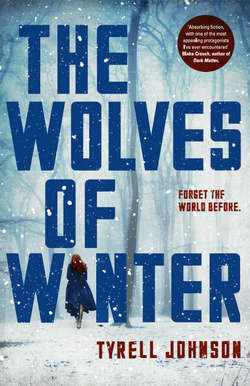Читать книгу The Wolves of Winter - Tyrell Johnson - Страница 14
Оглавление7
When Dad was dying, I used to read Walt Whitman to him. Mom made me wear a stupid mask over my mouth. He could probably barely hear me. “If anything is sacred, the human body is sacred.” I remember feeling weird about that line. Seeing my dad’s sunken lids and thinning hair and the wrinkles around his eyes that used to be laugh lines but had somehow turned into sad creases. Nothing about him looked sacred.
The wars had all but stopped. No more reports of bombs or gunfire or drone strikes. Nothing. The world had turned its attention to the flu. Maybe half of Eagle had already left, heading north. My friend Amanda told me that her mom said that the colder the temperatures the less likely it was to get the flu. Didn’t make sense to me.
“Is the flu going to kill us all?” I asked Dad one day. Light filtered through the piss-yellow curtains. On the windowsill was a can of Coke surrounded by water rings that looked like Olympic symbols.
Dad shook his head. “It’s not going to kill you. You’re a survivor. Come here.” I stood from my chair and walked over to his bed. It was closer than I was supposed to get. A single bead of sweat trailed his forehead, disappearing down the side of his face. “First you survive here.” He pointed to my head. “Then here.” He pointed to my stomach. “Then here.” He pointed to my heart. “You have to have all three.”
My hands were shaking.
“You’re gonna do fine, Lynn.” He rested his hand on my arm. He wasn’t supposed to. “You’re a survivor.”
Turns out, he was right.
Jax had gone—or been escorted, rather—to Jeryl’s cabin after dinner. Dinner had been mostly quiet. Small talk here and there. A lot of stares. A lot of tension. Even the sound of a boot scuffling beneath the table seemed to set everyone on edge. Ramsey had looked especially agitated. Kept giving Jax the stink eye. Ken mouthed off once or twice, Jeryl asked a few less interview-like questions about game and hunting and Wolf, and Mom sat silently, chewing her meat like she was trying to kill the thing all over again.
That night was clear and full of stars. In Chicago, I remembered nights where you could make out only a single star, high in the sky, escaping the purple hum of electric light. But that’s hard for me to picture now. After moving to Eagle, Alaska, a tiny town, and then to McBridesville, Yukon, a much smaller town, I was used to the stars. There were so many of them that they smeared together into a silver bulb that reflected off the snow. A black canvas of stars, a white canvas of stars. Me, caught in the middle.
I decided to go for a walk. Mom and Jeryl hated when I walked at night, but they couldn’t do shit about it. I was a grown woman. Ken used to joke, “Bet she’s sneaking off to Conrad’s place. Atta girl.” He didn’t make that joke tonight.
I headed east up one of the hills that framed our little homestead. From there you got a nice view of the valleys, the river, and the hills beyond. I walked slowly, my feet punching holes in the untouched snow. The point wasn’t to get somewhere—the point was to be out. Sometimes the cabin felt too close. In winter, we’d get hit with long, heavy storms, and during those times we’d all be cooped up between those walls for way too long. So I tried to get out as much as I could while I could.
I reached the top of the hill. The pine, fir, and spruce trees were bent like old men, carrying their burden of snow. A few dead birch, poplar, and cottonwood trees stood closer to the river, their spindly branches sleeping out the cold. Everything was so clear, so sharp under the light of the stars, you could cut your finger on it. It really was a beautiful place. You just had to get over the freezing weather, the darkness, the loneliness, the cabin fever, the boredom—oh God, the boredom—the shitty food, and the repetitive routine.
I heard rustling behind me and turned. Bounding up the hill was a white figure. An animal. Wolf. Not a wolf. But Wolf. He charged at me, and for half a second, I thought he’d gone feral. My hand dropped to my Hän knife at my belt. He nearly barreled into me, but kept on going a few feet before turning around. He paused, staring at me. His tongue was out, flopped to one side like it was too heavy for his mouth. I didn’t know what to do. Did he want me to throw a stick or something? He circled the snow once or twice, then sat, leaning up against my leg, panting. He was surprisingly heavy.
Dogs are weird.
With every breath, his shoulders push, push, pushed against my leg. I put a hand on his head. He thrust his nose into my forearm as I scratched his ear. His thick fur was slightly wet from the snow. Even through my gloves, it felt like three wool sweaters in one. He was made for this place. Made for winter.
Eventually, he lay down in the snow like it was a warm bed. A paw on my foot. I didn’t mind. I sat next to him, feeling his breath move in and out. It was odd, having company like this. It got me thinking. I wondered how long Jax and Wolf would stay, wondered how far north they’d go, wondered what life would be like running off into the wilderness with a dog and a stranger.
